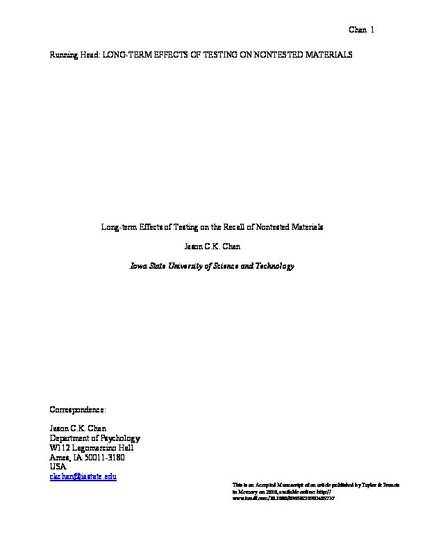
Article
Long-term Effects of Testing on the Recall of Nontested Materials
Memory
Document Type
Article
Disciplines
Publication Date
1-1-2010
DOI
10.1080/09658210903405737
Abstract
Testing, or memory retrieval, is a powerful way to enhance long-term retention of studied material. Recent studies have shown that testing can also benefit later retention of related but nontested material (a finding known as retrieval-induced facilitation, Chan, McDermott, & Roediger, 2006), but the long-term consequences of this benefit is unknown. In the current experiment three retention intervals—20 minutes, 24 hours, 7 days—were used to assess the effects of testing on subsequent recall of the nontested material. The results indicate that the magnitude of retrieval-induced facilitation, like that of the testing effect (i.e., the memorial benefit of testing on the tested material), increases with delay at the beginning (i.e., between 20 minutes and 24 hours) but asymptotes afterward (i.e., between 24 hours and 7 days). Theoretical and applied implications of this finding are discussed.
Copyright Owner
Chan, et al.
Copyright Date
2010
Language
en
File Format
application/pdf
Citation Information
Jason C.K. Chan. "Long-term Effects of Testing on the Recall of Nontested Materials" Memory Vol. 18 Iss. 1 (2010) p. 49 - 57 Available at: http://works.bepress.com/jason_chan/15/

This is an Accepted Manuscript of an article published by Taylor & Francis in Memory on 2010, available online: http:// www.tandf.com/10.1080/09658210903405737